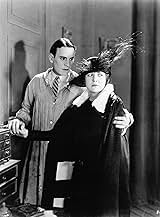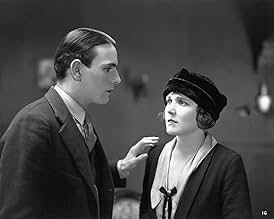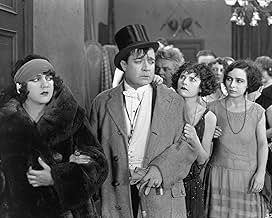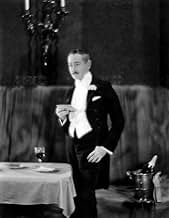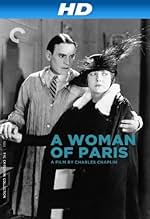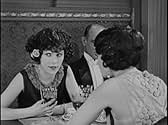AVALIAÇÃO DA IMDb
6,9/10
6,6 mil
SUA AVALIAÇÃO
Uma mulher sustentada pelo marido encontra seu ex-noivo e se vê dividida entre o amor e o conforto.Uma mulher sustentada pelo marido encontra seu ex-noivo e se vê dividida entre o amor e o conforto.Uma mulher sustentada pelo marido encontra seu ex-noivo e se vê dividida entre o amor e o conforto.
- Prêmios
- 3 vitórias no total
Charles K. French
- Jean's Father
- (as Charles French)
Nellie Bly Baker
- Masseuse
- (não creditado)
Henry Bergman
- Head Waiter
- (não creditado)
Charles Chaplin
- Station Porter
- (não creditado)
Frank Coghlan Jr.
- Boy
- (não creditado)
Antonio Corsi
- Accordion Player
- (não creditado)
Harry d'Abbadie d'Arrast
- Man in Nightclub
- (não creditado)
Stella De Lanti
- Revel's Fiancée
- (não confirmado)
- (não creditado)
Jean de Limur
- Man in Nightclub
- (não creditado)
Charles Farrell
- Man in Nightclub
- (não creditado)
Bess Flowers
- Mannequin
- (não creditado)
Avaliações em destaque
A Woman Of Paris was an acclaimed success with the critics when it was Originally released on 1st October 1923. However, the audience despised it as they wanted to see Charlie Chaplin the tramp starring in a film not a film directed by Chaplin in which he does not appear (albeit in a small cameo role). When i first saw the film on BBC2 around Christmas 1998 i thought Chaplin had a starring role so was naturally disappointed when i found out this wasn't the case. However, since then i have become a huge fan of Chaplin and all his work so now I think this film is rated among Chaplin's best features. His musical score composed in 1976 with Eric Rogers was Chaplin's last ever work in his film career which spanned 62 years. By 1976 Chaplin was very frail and struggled to communicate so the fact that he could compose the music for a near 80 minute film is amazing and the fact that the music score is as good as any of his other films is also astonishing. Charles Chaplin was a true genius of Cinema and A Woman Of Paris is an excellent example of Chaplin as director, writer and composer.
This is an exquisite film that needs to be seen with some understanding of the era in which it was made. It was a critical success for good reason, and it's ironic style and subtle acting was a great influence on directors such as Lubitsch. It was not a popular success in the US but was well understood and acclaimed as such in Europe. I notice that some reviewers decry it as melodrama, but there is no reason why melodrama should not be an acceptable form of art. I would urge viewers to immerse themselves more in the treasures of the silent cinematic era, as there are many lessons to be learned therefrom for today's aspiring artists in any medium.
Charles Chaplin is noted for his comedy performances, and deservedly.
His direction, though, should be more highly regarded, if only for this one motion picture.
Compare the quality of the photography and the smoothness of the editing to, for example, "The Gold Rush," of about the same time.
"A Woman of Paris" is very modern; "The Gold Rush" is downright primitive (but, in spots, brilliant).
"A Woman of Paris" also shows some admirable acting talent in, really, all the players. Some of the lesser characters are still played beautifully, despite being "lesser," especially Marie's maids and her, more or less, friends, and very especially the masseuse.
And the scene where the artist's mother, played by Lydia Knott, bent on revenge, comes upon Marie -- with no words, just body movement and facial expression -- she tells the audience what the proverbial thousand words could not so well.
Credit for part of that good acting must, of course, go to the director, but even the best director can't make much of poor actors.
Chaplin had very good actors. Adolphe Menjou reached stardom, and deservedly. What a tremendous talent; he could do everything.
Edna Purviance should have achieved much more acclaim. She performed admirably, especially in this movie, and she was attractive. Fame is certainly fickle.
In some ways, "A Woman of Paris" might be written off by a few as "soap opera." But it is well worth watching for the performances and, especially, for the directing.
His direction, though, should be more highly regarded, if only for this one motion picture.
Compare the quality of the photography and the smoothness of the editing to, for example, "The Gold Rush," of about the same time.
"A Woman of Paris" is very modern; "The Gold Rush" is downright primitive (but, in spots, brilliant).
"A Woman of Paris" also shows some admirable acting talent in, really, all the players. Some of the lesser characters are still played beautifully, despite being "lesser," especially Marie's maids and her, more or less, friends, and very especially the masseuse.
And the scene where the artist's mother, played by Lydia Knott, bent on revenge, comes upon Marie -- with no words, just body movement and facial expression -- she tells the audience what the proverbial thousand words could not so well.
Credit for part of that good acting must, of course, go to the director, but even the best director can't make much of poor actors.
Chaplin had very good actors. Adolphe Menjou reached stardom, and deservedly. What a tremendous talent; he could do everything.
Edna Purviance should have achieved much more acclaim. She performed admirably, especially in this movie, and she was attractive. Fame is certainly fickle.
In some ways, "A Woman of Paris" might be written off by a few as "soap opera." But it is well worth watching for the performances and, especially, for the directing.
A melodrama rather than the saucy Parisian comedy the title and the name of Charles Chaplin suggests. Promptly withdrawn by its creator, 'A Woman of Paris' was for over half a century one of those films whose reputation was based upon it's unavailability for reappraisal and like many of Chaplin's later films was to prove a disappointment when it was finally revived in the 1970s.
Both the plot and the wardrobe worn by Chaplin's leading lady Edna Purviance evokes the era of Chaplin's fellow United Artist D. W. Griffith rather than the continental sophistication suggested by the title, while the presence of Adolphe Menjou happily anticipates the nascent sophistication of the twenties.
Both the plot and the wardrobe worn by Chaplin's leading lady Edna Purviance evokes the era of Chaplin's fellow United Artist D. W. Griffith rather than the continental sophistication suggested by the title, while the presence of Adolphe Menjou happily anticipates the nascent sophistication of the twenties.
'A Woman of Paris' is rather a curiosity in Charles Chaplin's filmography. It stands as the only pure drama he wrote and directed. The film he made just to help foster Edna Purviance's career independent from him. This film was Edna's first and practically the last leading role ('A Woman of the Sea' from 1926 was never released and is now considered to be lost), which, of course, is a pity, because besides being gorgeous, she was a fine actress, and was able to shine on her own not only as of the sidekick of The Tramp. The complex role Marie St. Clair proved that. The film itself was a failure at cinemas not because it was bad (critics at that time liked it), but because Chaplin wasn't in it (only for a brief cameo - a man carrying the box in the trainstation). And it was, oh the horror! a drama.
I guess that's the reason, why Chaplin never tried his hand at a serious movie ever again (although he experimented with quite risky stuff later in his career). That's another pity - because Chaplin truly knew how to create complex characters amid moral turmoils and dilemmas. 'A Woman of Paris' is undoubtedly with flaws. Well, it was practically Chaplin's second feature film and the first time where he ventured that far from his comfort zone.
Altogether, 'A Woman in Paris' is a good drama (probably a bit overly melodramatic by the end), and needs more recognition from Chaplin fans and all silent cinema admirers alike. It really shows that Chaplin was much more diverse and deep as a filmmaker than just offering magnificent laughs.
I guess that's the reason, why Chaplin never tried his hand at a serious movie ever again (although he experimented with quite risky stuff later in his career). That's another pity - because Chaplin truly knew how to create complex characters amid moral turmoils and dilemmas. 'A Woman of Paris' is undoubtedly with flaws. Well, it was practically Chaplin's second feature film and the first time where he ventured that far from his comfort zone.
Altogether, 'A Woman in Paris' is a good drama (probably a bit overly melodramatic by the end), and needs more recognition from Chaplin fans and all silent cinema admirers alike. It really shows that Chaplin was much more diverse and deep as a filmmaker than just offering magnificent laughs.
Você sabia?
- CuriosidadesThe reissue of this film, with a musical score and new cut by Sir Charles Chaplin, was the last work of his entire film career. By then, the 87-year-old Chaplin was visibly frail but still walking. His score was aided by arranger Eric James, and he took a small theme from Monsieur Verdoux (1947), but most of the score was Chaplin's. The film was reissued posthumously in 1977 with the new score to overwhelming critical and public praise. At that time, many critics praised it (as in the trailer) as one of the best films ever made.
- Erros de gravaçãoWhen Jean starts fighting with Pierre in the restaurant, Pierre's glass of wine or champagne gets knocked over. When Pierre sits down on the table afterwards, the glass stands on the table filled with drink as if it hadn't been knocked over.
- Citações
[Intertitle]: Time heals, and experience teaches that the secret of happiness is in service to others.
- Versões alternativasDuring 1976, Chaplin was preparing a reissue of A Woman of Paris/Sunnyside but died before completion. The project was completed after his death, and the films were reissued in the United States by Kino International Corp. in 1978. This version, however, dispensed with an opening subtitle, as well as a few brief insert shots.
- ConexõesFeatured in Chaplin Today: Modern Times (2003)
Principais escolhas
Faça login para avaliar e ver a lista de recomendações personalizadas
- How long is A Woman of Paris: A Drama of Fate?Fornecido pela Alexa
Detalhes
- Data de lançamento
- País de origem
- Central de atendimento oficial
- Idioma
- Também conhecido como
- Una mujer de París
- Locações de filme
- Empresa de produção
- Consulte mais créditos da empresa na IMDbPro
Bilheteria
- Orçamento
- US$ 351.000 (estimativa)
- Faturamento bruto mundial
- US$ 12.921
- Tempo de duração1 hora 22 minutos
- Mixagem de som
- Proporção
- 1.33 : 1
Contribua para esta página
Sugerir uma alteração ou adicionar conteúdo ausente

Principal brecha
By what name was Casamento ou Luxo (1923) officially released in India in English?
Responda
